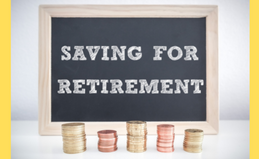Are you saving enough for retirement?

The first rule to a good retirement savings plan is to start early. One of the biggest factors that helps your retirement savings grow is compound interest. No matter what stage of life you find yourself in, it’s important to be thinking about saving money for retirement. Below are some projections of what you should aim to save for retirement as you go through the decades.
Retirement Savings By Age:
Retirement savings in your 20s
Typically speaking, 20s is the beginning of a new career with an entry-level paycheck. Even so, saving a small percentage of your income can get your started on the right track. If your employer offers matching funds
to a 401(k), you should take full advantage of that offer and do whatever it takes to max out your employer’s offer. That is free money toward retirement so why not take it?
Retirement savings in your 30s
By the time your 30s roll around, you’re probably looking at buying a house and starting a family. Not only are these expensive changes, they can be a distraction to your savings goals. However, in your 30s you are gaining more work experience and are becoming more established in your career, resulting in a higher paycheck. It’s important to start focusing on long-term goals, such as retirement, even though it seems far off. Keep in mind, you’re still young enough to have a higher risk tolerance.
Retirement savings in your 40s
By this time, your debt is hopefully lower allowing you to focus more on savings. Financial experts recommend aiming to have up to four times your annual salary saved by the time you’re in your late 40s. That figure may seem nearly impossible to reach, but don’t let that discourage you. If you are behind in your savings, make retirement a priority in your budget, right after essential needs. Any type of raise or bonus should go straight into savings if you’re playing catch-up!
Retirement savings in your 50s
Retirement is not far off now that you’ve reached your 50s, so it’s time to buckle down. At this stage in life, the biggest expenses are often college tuition for children and medical bills. Data shows you should have five times your income in retirement savings. If you don’t, you are eligible to contribute extra money to your IRA and 401(k) as a way to catch up.
Retirement savings in your 60s
You’re nearing the finish line! What are your goals and plans for retirement? Be sure to include covering medical costs during retirement. And, if you are hoping to travel or purchase a beach house, your retirement savings should reflect that. It’s suggested you should have approximately seven times your income in retirement savings. If your funds are lower than you hoped for, you can consider working part-time to help decrease the time you’ll need to use retirement savings.
If you haven’t reached the savings benchmarks, don’t panic! There are ways for you to play “catch up” based on your personal situation. We recommend talking to a professional about your finances and goals no matter what stage you’re in.
To set up an appointment to discuss your current situation, call us at 717.436.2144 or visit us online and we’d be happy to help guide you to meet and exceed your savings goals.